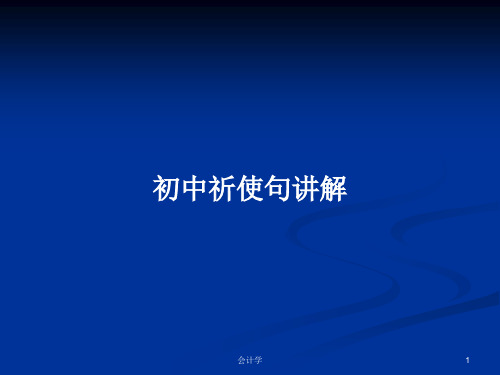祈使句的反义疑问句(课堂PPT)
合集下载
反义疑问句(共14张PPT)

+ You have to believe in yourself. That's the secret of success. 人必须相信自己,这是成功的秘诀。
+
特殊用法2-----There be 句型
陈述部分是“there be”结构时,疑问部分用be there。
There is something wrong with your watch, isn't there?
Summary
一、反义疑问句的结构: 前肯+后否 ;前否+后肯
二、反义疑问句的四种特殊用法 1、祈使句的反义疑问句 2、There be 句型的反义疑问句 3、陈述部分有hardly等词时,提问用肯定形式。 4、反义疑问句的回答(根据事实)
Thanks for listening! Goodbye!
Chinese,_c_a_n___h_e___? 6.Please call me,_w__o_n_’t_y_o_u__?
7.Let’s go home, s_h__a_l_l_w__e__ ?
8.Let us go home,w__i_l_l_y_o__u__?
9.Don’t play on the road,w__i_l_l_y__o_u_?
2、Let‘s 开头的祈使句,后用shall we? 而Let us 开 头的祈使句,后用will you ?
+9、要学生做的事,教职员躬亲共做;要学生学的知识,教职员躬亲共学;要学生守的规则,教职员躬亲共守。2024/3/72024/3/7Thursday, March 07, 2024 +10、阅读一切好书如同和过去最杰出的人谈话。2024/3/72024/3/72024/3/73/7/2024 1:35:33 PM +11、只有让学生不把全部时间都用在学习上,而留下许多自由支配的时间,他才能顺利地学习……(这)是教育过程的逻辑。2024/3/72024/3/72024/3/7Mar-247-Mar-24 +12、要记住,你不仅是教课的教师,也是学生的教育者,生活的导师和道德的引路人。2024/3/72024/3/72024/3/7Thursday, March 07, 2024
+
特殊用法2-----There be 句型
陈述部分是“there be”结构时,疑问部分用be there。
There is something wrong with your watch, isn't there?
Summary
一、反义疑问句的结构: 前肯+后否 ;前否+后肯
二、反义疑问句的四种特殊用法 1、祈使句的反义疑问句 2、There be 句型的反义疑问句 3、陈述部分有hardly等词时,提问用肯定形式。 4、反义疑问句的回答(根据事实)
Thanks for listening! Goodbye!
Chinese,_c_a_n___h_e___? 6.Please call me,_w__o_n_’t_y_o_u__?
7.Let’s go home, s_h__a_l_l_w__e__ ?
8.Let us go home,w__i_l_l_y_o__u__?
9.Don’t play on the road,w__i_l_l_y__o_u_?
2、Let‘s 开头的祈使句,后用shall we? 而Let us 开 头的祈使句,后用will you ?
+9、要学生做的事,教职员躬亲共做;要学生学的知识,教职员躬亲共学;要学生守的规则,教职员躬亲共守。2024/3/72024/3/7Thursday, March 07, 2024 +10、阅读一切好书如同和过去最杰出的人谈话。2024/3/72024/3/72024/3/73/7/2024 1:35:33 PM +11、只有让学生不把全部时间都用在学习上,而留下许多自由支配的时间,他才能顺利地学习……(这)是教育过程的逻辑。2024/3/72024/3/72024/3/7Mar-247-Mar-24 +12、要记住,你不仅是教课的教师,也是学生的教育者,生活的导师和道德的引路人。2024/3/72024/3/72024/3/7Thursday, March 07, 2024
祈使句感叹句反义疑问句ppt课件.ppt

1.Do …
祈使句的肯定句式
省略主语,实意动词作谓语
Look at the line! It is very dangerous to cross it!
Keep your eye on the sky at the Astronomy Club!
2. be动词 + n./adj/prep. phrase 省略主语,be动词作谓语
反义疑问句
前肯后否 前否后肯
Monsters University is the best scaring school. Isn’t it?
Mike isn’t scary at all. Is he?
反意疑问句特殊情况 1. little/few/never/hardly/seldom/no/neither/
3. Let’s… Let’s phone her now, shall we? 我们现在就给她打电话,好吗? Let’s go to the cinema tonight, shall we? 今晚咱们去看电影,好吗?
5, 陈述部分是I am..,疑问部分要用 aren‘t I.
I am officially a college student. Aren’t I?
nobody/nothing/none等表示否定意义的词时, 疑问部分要用肯定形式。
None of them are scary. Are they?
• 2. unhappy, dislike,careless 等含有否定词缀 在派生词时,仍按肯定句对待,疑问部分 用否定形式。
• He looks unhappy today, doesn’t he ?
祈使句的否定句式
1. Don’t/Never do… Don’t/Never be…
祈使句的肯定句式
省略主语,实意动词作谓语
Look at the line! It is very dangerous to cross it!
Keep your eye on the sky at the Astronomy Club!
2. be动词 + n./adj/prep. phrase 省略主语,be动词作谓语
反义疑问句
前肯后否 前否后肯
Monsters University is the best scaring school. Isn’t it?
Mike isn’t scary at all. Is he?
反意疑问句特殊情况 1. little/few/never/hardly/seldom/no/neither/
3. Let’s… Let’s phone her now, shall we? 我们现在就给她打电话,好吗? Let’s go to the cinema tonight, shall we? 今晚咱们去看电影,好吗?
5, 陈述部分是I am..,疑问部分要用 aren‘t I.
I am officially a college student. Aren’t I?
nobody/nothing/none等表示否定意义的词时, 疑问部分要用肯定形式。
None of them are scary. Are they?
• 2. unhappy, dislike,careless 等含有否定词缀 在派生词时,仍按肯定句对待,疑问部分 用否定形式。
• He looks unhappy today, doesn’t he ?
祈使句的否定句式
1. Don’t/Never do… Don’t/Never be…
反意疑问句ppt课件

• Jack wasn’t playing soccer, _w__a_s _h_e___? • Their parents have gone to London,
__h_a_v_e_n_’_t t_h_e_y__? • I have never been to the park, __h_a_v_e_n’_t_I__? • You have a good friend, __d_o_n_’t_y_o_u___? • We had a meeting, __d_i_d_n_’t_w_e___?
Grammar: 反意疑问句
一、定义:
当我们陈述了一个事实,而又不是很 有把握,就可以在陈述句后加一个简 短问句,称为反意疑问句。它表示提 问人的看法,没有把握,需要对方证 实。反义疑问句由两部分组成:前一 部分是一个陈述句,后一部分是一个 简短的疑问句,两部分的人称时态应 保持一致。
二、结构:
结构一: 前肯,+ 后否 eg. She is a student, isn’t she?
结构二: 前否,+ 后肯 eg. She isn’t a student, is she?
三、反意疑问句的解答步骤
1. 判定(判断该用肯定还是否定); 2. 找动(找句子的助动词:be用be,动词原形do, 三单does,过去did,完成have); 3. 换代(将主语换为人称代词);
2. 一般动词(play, study, watch 等)句型:
现在 主语+play/plays…, don’t (doesn’t) + 主语? 过去 主语+played…, didn’t + 主语?
1 Your mother likes cooking ,_d__o_e_s_n_’t_s_h_e___? 2 He has an apple, __d_o_e_s_n_’_t _h_e____? 3 The plane took off an hour ago, __d_i_d_n_’t_i_t___? 4 He didn’t go to school late this morning,
高考英语二轮复习课件:专题十三反意疑问句-祈使句与感叹句(共55张PPT)

Байду номын сангаас
5. 陈述部分含有must表推测的反意疑问句 (1)对现在的推测 You must be hungry now,aren't you? 你此刻一定很饿,对吧? =I'm sure you're hungry now,aren't you? (2)对现在进行时的推测 He must be watching TV now,isn't he? 他现在一定在看电视,对吗? I'm sure he is watching TV now,isn't he?
A.isn't she B.hasn't she C.isn't it D.hasn't it 2.The ground is wet all over, so I'm sure it must have rained
否定、肯定形式
1. 一般说来,前后两部分的否定、肯定形式相反;但当句子前有Oh,Ah, So等语气词时,前面两部分的否定、肯定形式相同。 2. 前面部分有否定词或半否定词时,后面部分用肯定形式;但若前面部分 含有由否定词缀构成的否定词时,后面部分还是用否定形式。
There used to be a cinema here before the war,use(d) n't there/didn't there? Such things ought not to be allowed,ought they? He seldom comes late,does he? You don't think he can finish the work by himself,do you? Have a cup of tea,will you?
5. 陈述部分含有must表推测的反意疑问句 (1)对现在的推测 You must be hungry now,aren't you? 你此刻一定很饿,对吧? =I'm sure you're hungry now,aren't you? (2)对现在进行时的推测 He must be watching TV now,isn't he? 他现在一定在看电视,对吗? I'm sure he is watching TV now,isn't he?
A.isn't she B.hasn't she C.isn't it D.hasn't it 2.The ground is wet all over, so I'm sure it must have rained
否定、肯定形式
1. 一般说来,前后两部分的否定、肯定形式相反;但当句子前有Oh,Ah, So等语气词时,前面两部分的否定、肯定形式相同。 2. 前面部分有否定词或半否定词时,后面部分用肯定形式;但若前面部分 含有由否定词缀构成的否定词时,后面部分还是用否定形式。
There used to be a cinema here before the war,use(d) n't there/didn't there? Such things ought not to be allowed,ought they? He seldom comes late,does he? You don't think he can finish the work by himself,do you? Have a cup of tea,will you?
初中祈使句讲解PPT学习教案

第15页/共17页
Thank you!
第16页/共17页
2. 否定祈使句 否定祈使句的反意疑问句反问部分只 用 will you。 Don't be late again, will you? 别再迟到了,行不行?
第12页/共17页
3.Let型祈使句
表示请求或命令时,用 will you;表示建议或劝诱时,用 shall we。
:
Let's phone her now,
第9页/共17页
祈使句的肯定式
1. Do型 (即:动词原形+其它成分)。 如:Please have a seat here. 请这边坐。 有的祈使句在意思明确的情况下,动词 可省略 。 如:This way, please. = Go this way, please. 请这边走。
2. Be型 (即:Be + 表语(名词或形容词)+其它成分)。 如:Be a good boy! 要做一个好孩子!
Don't be late for school! 上学不要迟到!
2. Let型 Let型的否定式有两种:“Don‘t + let + 宾语 + 动词原形 + 其它成分”和“Let + 宾语 + not + 动词原形 + 其它成分”。 如:Don't let him go. / Let him not go. 别让他走。
3. Let型 (即:Let + 宾语 + 动词原形 + 其它成分) Let's go at once. 咱们马上动身吧。Let me try again. 让我再试试。 Let Tom go there himself. 让汤姆自己去那儿Do型和Be型 Do型和Be型的否定式都是在句首加don‘t构 成。 如:Don't forget me! 不要忘记我!
Thank you!
第16页/共17页
2. 否定祈使句 否定祈使句的反意疑问句反问部分只 用 will you。 Don't be late again, will you? 别再迟到了,行不行?
第12页/共17页
3.Let型祈使句
表示请求或命令时,用 will you;表示建议或劝诱时,用 shall we。
:
Let's phone her now,
第9页/共17页
祈使句的肯定式
1. Do型 (即:动词原形+其它成分)。 如:Please have a seat here. 请这边坐。 有的祈使句在意思明确的情况下,动词 可省略 。 如:This way, please. = Go this way, please. 请这边走。
2. Be型 (即:Be + 表语(名词或形容词)+其它成分)。 如:Be a good boy! 要做一个好孩子!
Don't be late for school! 上学不要迟到!
2. Let型 Let型的否定式有两种:“Don‘t + let + 宾语 + 动词原形 + 其它成分”和“Let + 宾语 + not + 动词原形 + 其它成分”。 如:Don't let him go. / Let him not go. 别让他走。
3. Let型 (即:Let + 宾语 + 动词原形 + 其它成分) Let's go at once. 咱们马上动身吧。Let me try again. 让我再试试。 Let Tom go there himself. 让汤姆自己去那儿Do型和Be型 Do型和Be型的否定式都是在句首加don‘t构 成。 如:Don't forget me! 不要忘记我!
祈使句ppt课件

请根据括号内的要求, 改写下列句子, 每空一词(含缩写)。 1. Get up earlier, or you will miss the
early bus. (改为同义句) _I_f you_d_o_n_'_t get up earlier, you will miss the early bus.
4. I haven't decided when I shall leave.(改为简单句) I haven't decided_w_h_e_n_ t_o_ leave.
5. The job might match your skills. (改为否定句) The jobm__i_g_h_t n__o_t match your skills.
祈使句的反意疑问句
反意问句 Open the door, will you? Let’s go by bus, shall we? Let the boy go first, will you?
一个重要句型
祈使句, and/then 主can/will do… 祈使句, or 主语 cannot/ won’t do… Examples: 1) Think hard, and you will come up with an
注意: Let's型祈使句,其否定式也可用 Let’s not … 如: Let's not have rest. 咱们别休息了。 Let's not sit here! 我们不要坐在这儿!
祈使句的答语
Tom: Remember to turn off the light ! John: I will. Tom: Don’t forget your homework! John: I won’t. Tom:Don’t come to school late again! John: Sorry, I won’t.
祈使句公开课课件PPT课件

第7页/共16页
二.祈使句的肯定句式 祈使句的肯定句式一般分为以下三种类型: 1.行为动词原形+其它成分。 例如:Make sentences after the model.根据例句 造句。
Have a good time. 愿你玩得痛快。
2. Be动词+其它成分(形容词、名词或介词短语等) 。 例如:Be careful when crossing the street.过马 路时要小心。
1.在祈使句的肯定句式前加Don’t,构成『Don’t +行为动词原形+其它成分』。Don’t say that again!别再那样说了!
2.在Be动词引起的肯定祈使句前加Don’t,构成『 Don’t be+其它成分(形容词、名词或介词短语等) 』。注意:在这种句型中be不能省略;否定副词 not不可置于be之后。 例如:Don’t be careless.不要粗心。
Let’s take a walk after supper, shall we?晚饭后我们
去散步,好吗?
第11页/共16页
五.祈使句的应答句
祈使句的动作是未发生的动作,常用I will.来回答 其肯定式,表示愿意接受请求或命令,用I won't.来回答 其否定式。另外,常用All right. / OK. / Yes, let's... / A good idea.等来回答Let's...句式,表示接受建议;用 You may. / You can.等来回答Let us...句式,表示允许 或同意。 [原题再现]
第9页/共16页
3.Let的宾语是第一人称时,否定式为宾语后加not ; let的宾语是第三人称时,否定式常为let前加 don't。如: Let's not waste time. 咱们别浪费时间了。 Don't let them make any noise. 别让他们吵。
二.祈使句的肯定句式 祈使句的肯定句式一般分为以下三种类型: 1.行为动词原形+其它成分。 例如:Make sentences after the model.根据例句 造句。
Have a good time. 愿你玩得痛快。
2. Be动词+其它成分(形容词、名词或介词短语等) 。 例如:Be careful when crossing the street.过马 路时要小心。
1.在祈使句的肯定句式前加Don’t,构成『Don’t +行为动词原形+其它成分』。Don’t say that again!别再那样说了!
2.在Be动词引起的肯定祈使句前加Don’t,构成『 Don’t be+其它成分(形容词、名词或介词短语等) 』。注意:在这种句型中be不能省略;否定副词 not不可置于be之后。 例如:Don’t be careless.不要粗心。
Let’s take a walk after supper, shall we?晚饭后我们
去散步,好吗?
第11页/共16页
五.祈使句的应答句
祈使句的动作是未发生的动作,常用I will.来回答 其肯定式,表示愿意接受请求或命令,用I won't.来回答 其否定式。另外,常用All right. / OK. / Yes, let's... / A good idea.等来回答Let's...句式,表示接受建议;用 You may. / You can.等来回答Let us...句式,表示允许 或同意。 [原题再现]
第9页/共16页
3.Let的宾语是第一人称时,否定式为宾语后加not ; let的宾语是第三人称时,否定式常为let前加 don't。如: Let's not waste time. 咱们别浪费时间了。 Don't let them make any noise. 别让他们吵。
祈使句的反义疑问句(课堂PPT)

⑵Don’t tell anyone, will you? 你可不要告诉任何人哟。
4
3. ①当祈使句为Let’s…时,反义 疑问句要用 shall we . ②当祈使句为 Let us…时,则要 分两种情况:
即表示请求时,反意疑问句用 will you,表示建议时,反意疑 问句用 shall we。
youwontyouwouldyou三者在祈使句的反义疑问句的区别would用于庄重场合表示有礼貌的请求或表示语气婉转近似于请您
祈使句的反义疑问句
1
1、若陈述部分为祈使句,其反义疑问句 通常用will you, won’t you, would you等。
• Give me a hand, will you? 帮我一下忙,好吗?
7
• Remember to buy some stamps, won’t you? 记 着买些邮票,好吗?
• Open a window, would you? 你打开一扇窗,好 不好?
2
will you, won’t you, would you三者 在祈使句的反义疑问句的区别
• would用于庄重场合,表示有礼貌的请求或表示, 语气婉转,近似于“请您”。
• will就变成一种不加掩饰的请求,语气直率,近似 于“请你”。
• won't you 语气则更加强烈
若陈述部分为祈使句,反义疑问句通常两者都可以用。 Open the door, will you? /won’t you?把门打开,好吗?
3
2、 若陈述句是否定的祈使句时, 则反义疑问句部分只用肯定式will you.(根据语境需要可用can you) e.g.⑴Don’t forget. will you? 别忘了,好吗?
4
3. ①当祈使句为Let’s…时,反义 疑问句要用 shall we . ②当祈使句为 Let us…时,则要 分两种情况:
即表示请求时,反意疑问句用 will you,表示建议时,反意疑 问句用 shall we。
youwontyouwouldyou三者在祈使句的反义疑问句的区别would用于庄重场合表示有礼貌的请求或表示语气婉转近似于请您
祈使句的反义疑问句
1
1、若陈述部分为祈使句,其反义疑问句 通常用will you, won’t you, would you等。
• Give me a hand, will you? 帮我一下忙,好吗?
7
• Remember to buy some stamps, won’t you? 记 着买些邮票,好吗?
• Open a window, would you? 你打开一扇窗,好 不好?
2
will you, won’t you, would you三者 在祈使句的反义疑问句的区别
• would用于庄重场合,表示有礼貌的请求或表示, 语气婉转,近似于“请您”。
• will就变成一种不加掩饰的请求,语气直率,近似 于“请你”。
• won't you 语气则更加强烈
若陈述部分为祈使句,反义疑问句通常两者都可以用。 Open the door, will you? /won’t you?把门打开,好吗?
3
2、 若陈述句是否定的祈使句时, 则反义疑问句部分只用肯定式will you.(根据语境需要可用can you) e.g.⑴Don’t forget. will you? 别忘了,好吗?
英语语法反义疑问句ppt

祈使句的反意疑问句
肯定的祈使句:won’t you ? / will you ? 祈使句的反意疑问句
否定的祈使句:will you ? 注:Let’s … , shall we?
Let us…, will you? e.g. Let us go to watch the movie, will you ? Let’s walk to the shops instead of taking the car, shall we ? Don't play computer games, will you?
B. is she
C. did she C. hasn’t he C. did she C. don’t they C. hasn’t she
D. wasn’t she D. doesn’t he D. didn’t she D. will they D. has she
6. There won’t be any concert this Saturday evening, C ?
A. will there not
B. will there C. is there
D. won’t there
7. He dislikes the two subjects, B he?
A. does
B. doesn’t
C. is
8. Let’s go there by bus, B ?
D. isn’t
特殊的反意疑问句
特殊的反意疑问句: (1) 主+ used to do sth, didn't/usedn't+主?
She used to get up at 7 o'clock, didn't/usedn't she ?
中考复习 反义疑问句 祈使句 感叹句 (共17张PPT)

一. 感叹句 4. ___H_o_w____ interesting the dog is!
How + 形容词/副词 + 主 +谓
5. ___H_o_w____ useful a subject it is! How + 形容词 + a/an + 可数名词单数+主+谓
6. ___H_o_w_____ time flies! How + 主+ 谓
否定的祈使句句型 Don`t be late. Let`s not speak loudly.
Don`t + v Let`s + not + v
3. --- _W__h__a_t_a_ pleasant journey it is!
What a/an adj.+ n! Journey 可数名词
二. 祈使句
以动词原形开头,主语省略
Come in!
Be quiet!
有时为了加强语气,在动词前加do, 表“务必”
Do come on time!
有否定词的反义疑问句
判定找动换代
1. Bob rarely got drunk, _d__id___he?
2. She seldom goes to the cinema, __d_o_e_s_she?
陈述部分有seldom, hardly, never, rarely, few, little, nowhere, nothing, nobody, scarcely等(半)否定词时,附加疑问词用肯定形式。
Tom has a new watch, _d_o__e_s_n_`_t_/_h_a__s_n_`_t_ he ?
6年级 Lesson 5 -祈使句和反义疑问句 PPT

be worried about…担心……
station /'steɪʃ(ə)n/ 车站
n. a building and the surrounding area where buses or trains stop for people to get on or off.
翻译:纽约大都会终点站是世界上最大的火车站。 e.g. The Grand Central Terminal is the biggest railway station in the world.
5. station /'steɪʃ(ə)n/ adj. 6. roast /rəʊst/ n. 7. afraid /ə'freɪd/ adj. 8. foolish /'fuːlɪʃ/ adj.
chat /tʃæt/ 闲谈;聊天
v. to talk to someone in a friendly informal way.
A greedy king
1
Vocabulary – 必考词汇
2
Article – A greedy king
3
Grammar – 祈使句与反义疑问句
1. chat /tʃæt/ v. 2. invite /ɪn'vaɪt/ v. 3. notice /'nəʊtɪs/ v. 4. worried /'wʌrɪd/ adj.
“I want it to be the last dish. I’ll cut the tree down.”“ But I'm afraid it will fly away when you begin to cut the tree,” said King. “Don’t worry about it, dear, the woman said with a smile. " It is a foolish bird. It doesn’t know when to leave.”
station /'steɪʃ(ə)n/ 车站
n. a building and the surrounding area where buses or trains stop for people to get on or off.
翻译:纽约大都会终点站是世界上最大的火车站。 e.g. The Grand Central Terminal is the biggest railway station in the world.
5. station /'steɪʃ(ə)n/ adj. 6. roast /rəʊst/ n. 7. afraid /ə'freɪd/ adj. 8. foolish /'fuːlɪʃ/ adj.
chat /tʃæt/ 闲谈;聊天
v. to talk to someone in a friendly informal way.
A greedy king
1
Vocabulary – 必考词汇
2
Article – A greedy king
3
Grammar – 祈使句与反义疑问句
1. chat /tʃæt/ v. 2. invite /ɪn'vaɪt/ v. 3. notice /'nəʊtɪs/ v. 4. worried /'wʌrɪd/ adj.
“I want it to be the last dish. I’ll cut the tree down.”“ But I'm afraid it will fly away when you begin to cut the tree,” said King. “Don’t worry about it, dear, the woman said with a smile. " It is a foolish bird. It doesn’t know when to leave.”
- 1、下载文档前请自行甄别文档内容的完整性,平台不提供额外的编辑、内容补充、找答案等附加服务。
- 2、"仅部分预览"的文档,不可在线预览部分如存在完整性等问题,可反馈申请退款(可完整预览的文档不适用该条件!)。
- 3、如文档侵犯您的权益,请联系客服反馈,我们会尽快为您处理(人工客服工作时间:9:00-18:30)。
• won't you 语气则更加强烈
若陈述部分为祈使句,反义疑问句通常两者都可以用。 Open the door, will you? /won’t you?把门打开,好吗?
3
2、 若陈述句是否定的祈使句时, 则反义疑问句部分只用肯定式will you.(根据语境需要可用can you) e.g.⑴Don’t forget. will you? 别忘了,好吗?
⑵Don’t tell anyone, will you? 你可不要告诉任何人哟。
4
3. ①当祈使句为Let’s…时,反义 疑问句要用 shall we . ②当祈使句为 Let us…时,则要 分两种情况:
即表示请求时,反意疑问句用 will you,表示建议时,反意疑 e a taxi, shall we?
我们坐出租车好吗?
● Let us know your address, will you?
请把你的地址告诉我们,好吗?
● Let us go swimming together, shall we?
我们一起去游泳好吗?
6
That’s all,thank you!
7
祈使句的反义疑问句
1
1、若陈述部分为祈使句,其反义疑问句 通常用will you, won’t you, would you等。
• Give me a hand, will you? 帮我一下忙,好吗?
• Remember to buy some stamps, won’t you? 记 着买些邮票,好吗?
• Open a window, would you? 你打开一扇窗,好 不好?
2
will you, won’t you, would you三者 在祈使句的反义疑问句的区别
• would用于庄重场合,表示有礼貌的请求或表示, 语气婉转,近似于“请您”。
• will就变成一种不加掩饰的请求,语气直率,近似 于“请你”。
若陈述部分为祈使句,反义疑问句通常两者都可以用。 Open the door, will you? /won’t you?把门打开,好吗?
3
2、 若陈述句是否定的祈使句时, 则反义疑问句部分只用肯定式will you.(根据语境需要可用can you) e.g.⑴Don’t forget. will you? 别忘了,好吗?
⑵Don’t tell anyone, will you? 你可不要告诉任何人哟。
4
3. ①当祈使句为Let’s…时,反义 疑问句要用 shall we . ②当祈使句为 Let us…时,则要 分两种情况:
即表示请求时,反意疑问句用 will you,表示建议时,反意疑 e a taxi, shall we?
我们坐出租车好吗?
● Let us know your address, will you?
请把你的地址告诉我们,好吗?
● Let us go swimming together, shall we?
我们一起去游泳好吗?
6
That’s all,thank you!
7
祈使句的反义疑问句
1
1、若陈述部分为祈使句,其反义疑问句 通常用will you, won’t you, would you等。
• Give me a hand, will you? 帮我一下忙,好吗?
• Remember to buy some stamps, won’t you? 记 着买些邮票,好吗?
• Open a window, would you? 你打开一扇窗,好 不好?
2
will you, won’t you, would you三者 在祈使句的反义疑问句的区别
• would用于庄重场合,表示有礼貌的请求或表示, 语气婉转,近似于“请您”。
• will就变成一种不加掩饰的请求,语气直率,近似 于“请你”。
